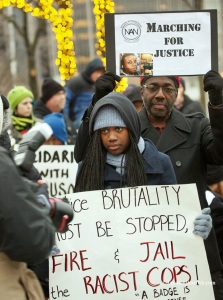-
Jail Darren Wilson NOW!
-
Drop All Charges Against Civil Rights Protesters
-
Stop the Racist Attacks Against Minority Youth
-
Jail the Killer Cops: A Badge is Not a License to Kill
-
End the Policy of Cover-up and Blaming the Victim
-
Down with the New Jim Crow! Down with the New Police State!
-
Build the Independent, Integrated, and Youth-led New Civil Rights Movement
-
No Justice in Ferguson. No Peace Anywhere!
BAMN Petition to Win Justice for Michael Brown – Download HERE!
The arrival of winter did not cool off the anger of the black community of Ferguson, Missouri. After months of grand jury proceedings, County Prosecutor Robert McCulloch managed to engineer a sham decision, but he could not forestall the waves of protest. Ferguson took to the streets again, joined in solidarity by demonstrations in over one hundred cities across the nation—including militant actions in Los Angeles, Oakland, and Detroit. Even in Europe, protesters gathered in London and Berlin. All of this, an international phenomenon against racism and police brutality, grew out of the bold initiative of one small community which, before August, hardly anyone had ever heard of.
However, a considerable portion of the world was paying attention by the time that the grand jury decision failed to indict the killer cop, Darren Wilson, on any charges. The majority-white, prosecutor-led grand jury would not press a single charge against a white officer who killed an unarmed black man—no case, no trial, and not even a pretense of concern for justice. According to the grand jury decision, the racist murder of Michael Brown would not even be treated as a crime. This echoed the legal response to the old Jim Crow lynchings, in which a black man could be killed on the basis of any accusation, and the legal system would have nothing to say about it.
County Prosecutor McCulloch led a charade grand jury process, designed to get the result he wanted while placing the responsibility on twelve other people. He notably carried out the same routine in the summer of 2000, when he would not indict two white officers who had killed two unarmed black men. Missouri Governor Jay Nixon led a state-enforced cover-up throughout the events, and deployed the National Guard against the only people who were fighting for justice. There is no reason to accept this process as final or even as a legitimate execution of due process: McCulloch must be removed and his grand jury process must be declared a sham—the decision must not stand. Killer cops should go to jail, and if the criminal justice system cannot achieve this, then the courts have no authority to pass sentences on anyone else.
“Let the justice system do its work,” this was the advice of the respected authorities and the civil rights celebrities who counseled for “peace” in Ferguson. The Ferguson resistance was very wise to ignore them, and now appears even wiser in the wake of the grand jury decision. For America’s most segregated black and Latino communities, where police can murder people with impunity, peace has never been an option—there is only the choice of whether to fight back. The Ferguson resistance has been revelatory in this regard. If there will be justice for Michael Brown, and if his killer eventually sits behind bars, it will be thanks to the courageous efforts of those who did not “let the justice system do its work,” but instead started fighting for justice themselves.
The movement for justice for Michael Brown has therefore produced yet another cause that is worth fighting for: the movement itself. That movement has provided the only dynamic possibility of achieving anything other than the business-as-usual routine of police violence and cover-up. That movement has braced every police department and government official in the nation against the new reality that their everyday abuses could now backfire in spectacular fashion. That movement is immeasurably more valuable to the cause of justice than any number of grand juries, federal investigations, media exposés, and political speeches. The “dialogues” for mediating racial tensions, and all other attempts to dissuade mass action and restore passivity, only seek to return the nation to conditions in which it will be easier to continue the police war against minority youth. For these reasons, every step in the direction of real struggle is its own victory, is important for its own sake, and is worth defending with as much devotion as the cause of justice for which the movement was built. Ferguson’s very first achievement has also been its greatest: people are fighting back.
The movement has gained the power and the authority that it needs to achieve its demands—starting with the rejection of the sham legal routine and the jailing of the killer cop. Already, political authorities are scrambling to figure out what promises they need to make in order to placate the struggle. And it has been clear for some time that killer cop Darren Wilson can never return to the Ferguson police force—in fact, every police officer in the nation now knows that his conduct can be placed under the very large magnifying lens of a mass movement. In dozens of communities, black and Latino youth for the first time in their lives have been able to express their power in the streets. The movement is just scratching the surface of its potential, and has no reason to settle for token measures from the politicians. We can win, and Ferguson has shown the way.
